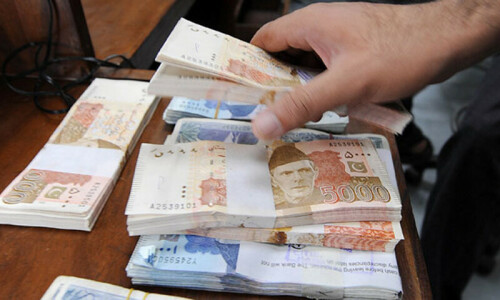KARACHI: The country’s Advance to Deposit Ratio (ADR) has been gradually contracting and stood at 37 per cent in June, down from 41pc in December.
This was revealed in the latest issue of A.F. Ferguson & Co’s PwC Banking Publication — Road to Sustainability. This year’s release features core themes like economy, credit penetration and digital transformation, carries insights from over 25 industry leaders, over 10 local and global surveys, snapshots of over 40 international banks and over 10 geographic regions.
“Investment to Deposit Ratio (IDR), on the other hand, has surged from 33pc in 2007 to 88pc in 2023 and 94pc in Jun-24,” the publication reported. These key benchmarks, relative to certain other economies, indicate an enormous potential for credit penetration in the country, it added. There was a sharp rise in profitability on the back of higher margins and non-funded income from different avenues. However, higher tax charges triggered disproportionate moderation in baseline profitability.
The publication offered suggestions for sustained, long-term economic growth. One of the core themes discussed with industry leaders and senior professionals was the country’s economic outlook. Experts underscored the importance of addressing structural deficiencies to improve GDP growth and other key economic indicators.
Only 3pc of SMEs borrow from banks; 75pc farmers rely on informal sources for credit
“Consistent economic policies and actionable long-term roadmap of interventions were also stressed upon,” said the Banking Publication. Experts see increasing imports and consumption as harmful for balance of payments and foreign exchange reserves, it added.
“Opportunities for export diversification and import substitution are enormous, especially in agriculture and tech sectors,” said the report.
Agriculture and SMEs
According to the report, SMEs and agriculture are the backbone of the nation’s progress. “Contributing 40pc of GDP, SMEs constitute nearly 90pc of all private enterprises in Pakistan, generate 30pc in export earnings and employ one-third of the country’s workforce,” said the report. “Out of five million enterprises, fewer than three per cent borrowed from banks,” it reported.
It said around 75pc of farmers still rely on informal sources of credit. Despite its historic importance, access to affordable growth capital remains restrictive.
“Financing for these critical sectors has been declining over the years and currently stands below eight per cent of total loans,” said the Banking Publication. Lending to the private sector is at 12pc of GDP, it added.
According to the publication, deposits grew significantly by 24pc to reach Rs29.1 trillion in 2023, with a further increase of 12pc in June this year, touching Rs32.5tr.
“Advances rose by four per cent to Rs13tr, much lower than 16pc growth rate of 2022, with no further increase till June 2024,” the report added. A significant expansion of 42pc was noted in investments, which reached Rs25.6tr last year and rose by 19pc to Rs30.4tr by June this year.
Borrowings were up by 51pc to Rs11.3tr last year, and by 12pc in Jun-24.
Published in Dawn, November 14th, 2024














































